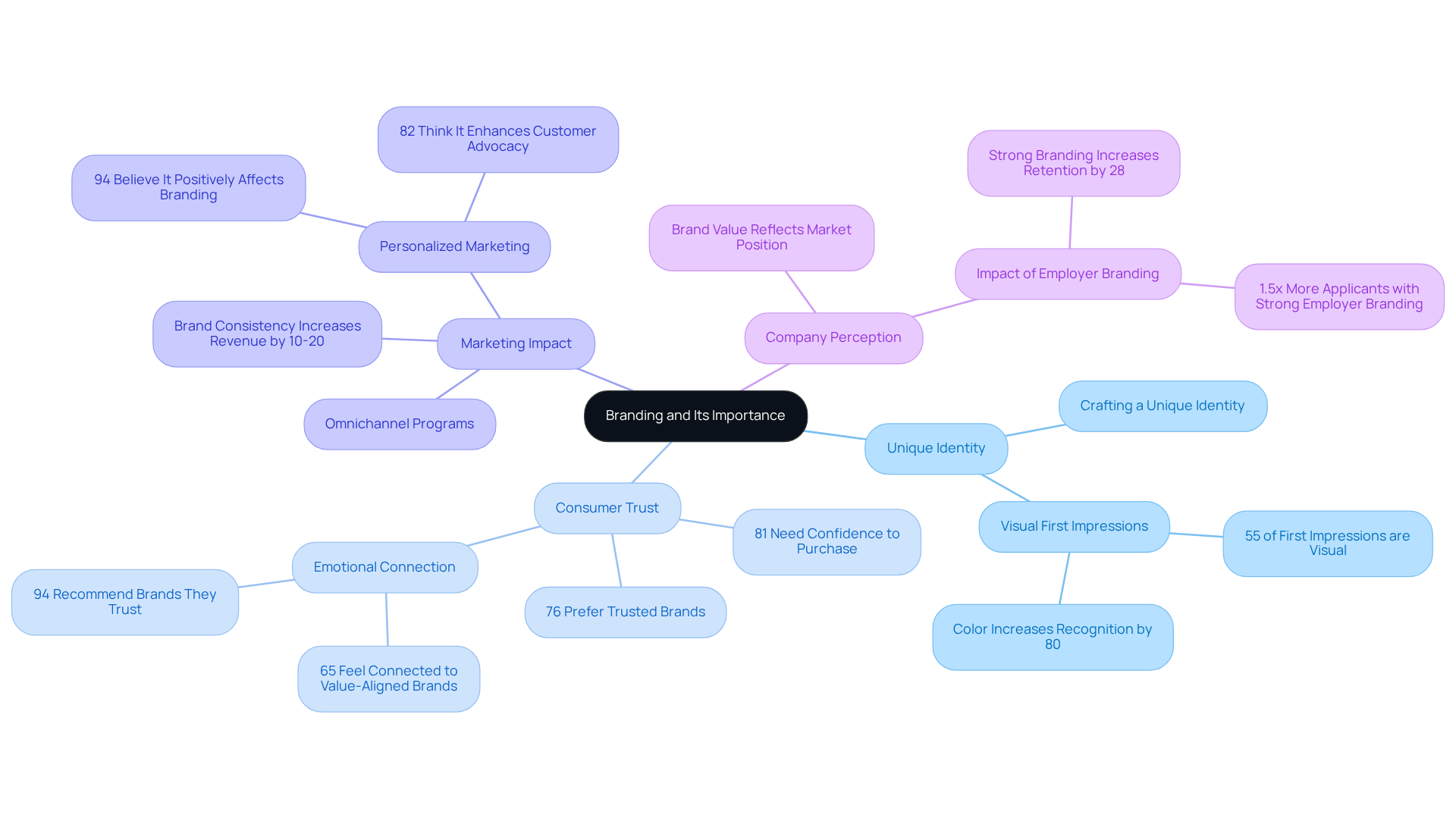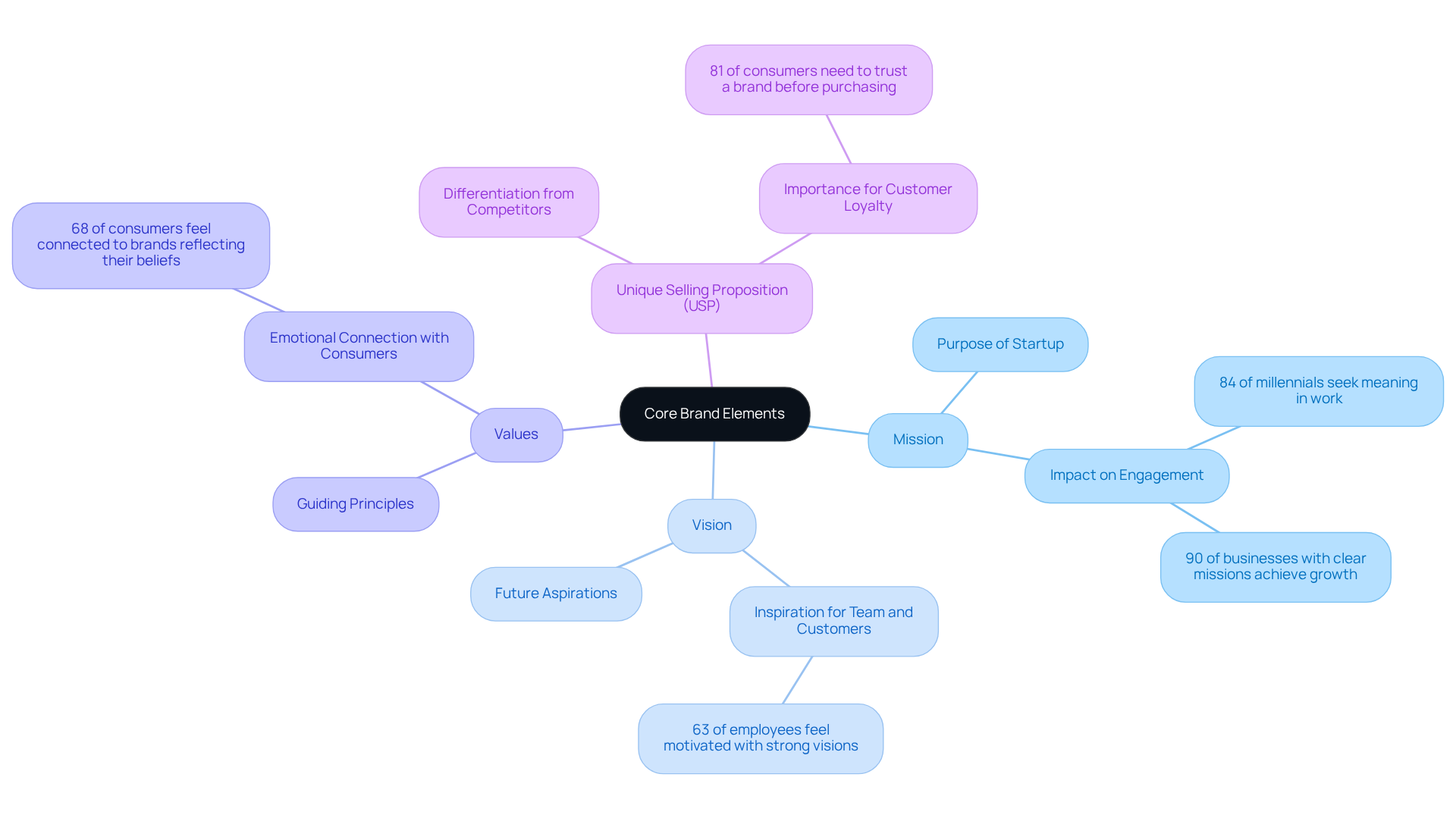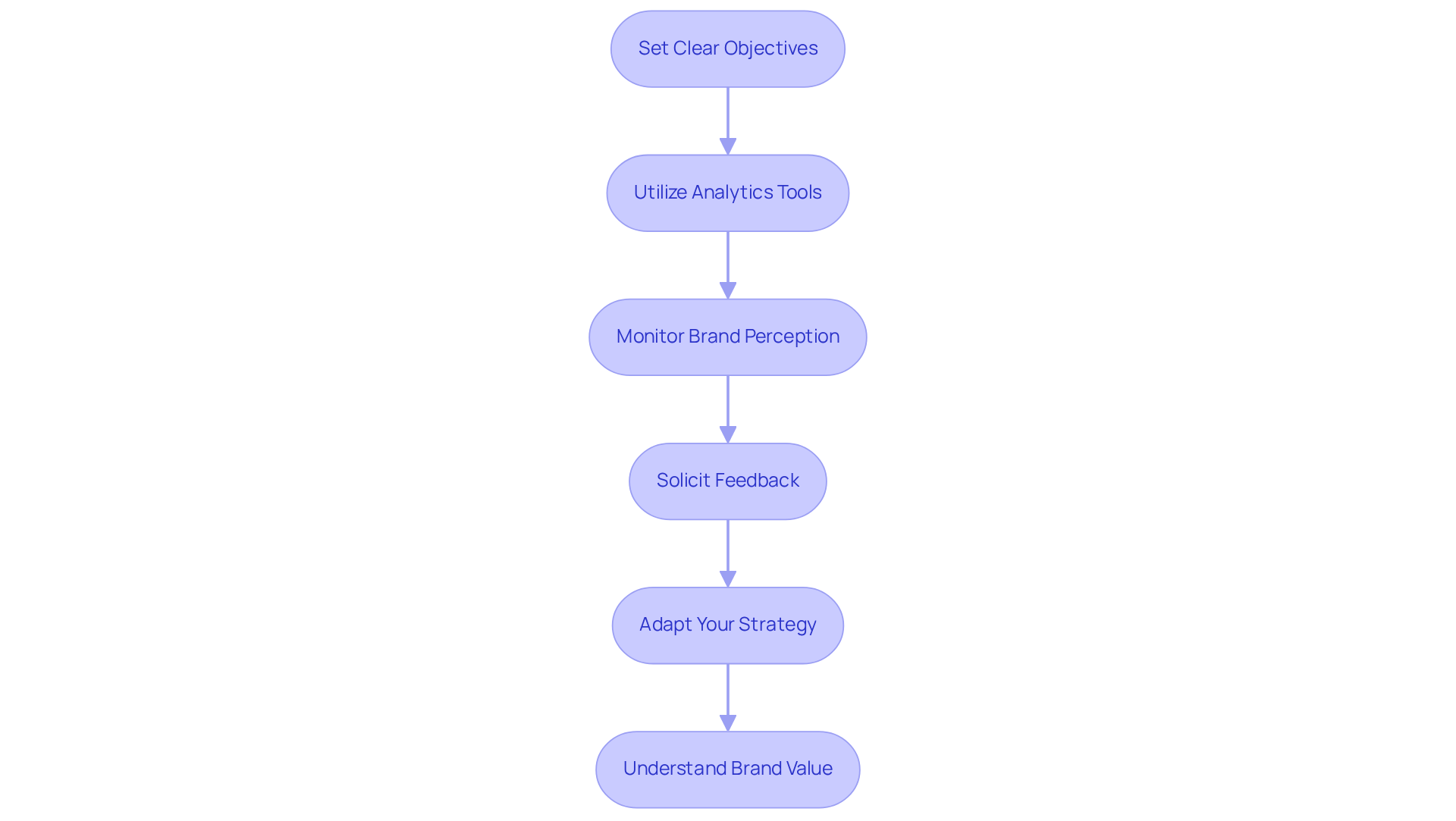Overview
For many tech startups, the journey of establishing a brand can feel overwhelming. The challenge lies in creating a unique identity that truly resonates with your target audience. This process encompasses essential elements like your mission, vision, values, and unique selling proposition (USP). It's understandable to feel uncertain about how to weave these elements together into a cohesive narrative. The implications of not having a strong brand identity can be significant; without it, trust and loyalty among consumers may wane, making it difficult to thrive in a competitive market.
But there’s hope. A strong brand identity is not just a luxury; it’s a necessity for long-term success. Studies have shown that a clear branding strategy can significantly enhance customer engagement and drive sales growth. Imagine the relief of knowing that your efforts in branding could foster deeper connections with your audience, ultimately leading to a more loyal customer base.
At RNO1, we understand the emotional weight of this process. We are here to support you in crafting a brand identity that not only reflects your values but also resonates with those you aim to serve. Together, we can navigate the complexities of branding, ensuring that your startup stands out in a meaningful way. Let’s embark on this journey together, transforming your vision into a brand that inspires trust and loyalty.
Introduction
Crafting a distinctive brand identity is not just important; it’s essential for tech startups navigating an increasingly competitive landscape. Many founders feel overwhelmed by the complexities of defining their brand in a way that truly resonates with their target audience. This struggle can lead to feelings of frustration, especially when effective branding is what establishes credibility and fosters customer loyalty. In a market saturated with options, how can a startup stand out and connect deeply with its customers?
The challenge of branding can feel daunting, but you are not alone. Many startups face similar hurdles as they seek to carve out their unique space in the industry. The implications of a poorly defined brand can be significant, often resulting in missed opportunities for engagement and growth. Yet, there is hope. By taking key steps to create a powerful brand identity, you can not only drive success but also cultivate lasting relationships with your customers.
Let’s explore some supportive strategies that can guide you in this journey. Together, we can navigate the complexities of branding, ensuring that your startup not only survives but thrives in today’s competitive landscape.
Define Branding and Its Importance
To define branding, it is essential to view it as a journey that involves crafting a unique identity for your startup that truly resonates with your audience. It encompasses your mission, vision, principles, and helps to define branding as the overall perception of your company in the marketplace.
Many tech startups grapple with the challenge of how to define branding; it’s not just about building credibility—it's about fostering loyalty among clients and setting your offerings apart from competitors. An engaging identity can simplify your marketing efforts, making it easier to communicate your value proposition and connect with potential customers.
In today’s digital-first world, where consumers encounter an average of 362 advertisements daily, to leave a lasting impression and enhance visibility by up to 3.5 times, it is essential to define branding with a clearly defined identity for those who maintain consistent presentation. Trust is paramount; 81% of consumers need to feel confident in a company before considering a purchase, which emphasizes how to define branding as .
Moreover, 76% of consumers define branding as a critical factor in their purchasing decisions, preferring to buy from companies they trust, even when cheaper alternatives exist. This illustrates how a powerful identity can help define branding as a cornerstone of long-term success, guiding startups through the complexities of the market.
At RNO1, we understand these challenges and empower modern companies to create transformative digital experiences across platforms. Our innovative performance marketing strategies, such as the Ryde initiative, focus on:
- Scaling omnichannel ambassador programs
- Enhancing e-commerce engagement through influencer partnerships
- Implementing luxury funnel messaging and user-generated content programs
This demonstrates how effective marketing can be amplified through strategic community engagement. As RNO1 reminds us, 'To define branding is to recognize that it builds trust, recognition, and loyalty, ultimately driving sales and client retention.'
We invite you to explore how we can support your journey in building a meaningful brand that resonates with your audience.

Identify Core Brand Elements
Building a robust brand can feel daunting, especially for startup founders striving to carve out their place in a competitive market. Identifying core elements is essential for establishing a strong market presence, and it’s okay to seek guidance in this process. These elements include:
- Mission: What is your startup's purpose? Clearly defining the problem you aim to solve and the impact you aspire to create is crucial. A well-articulated mission can drive engagement, especially since 84% of millennials prioritize finding meaning in their work. Furthermore, over 90% of businesses with well-defined mission statements achieve growth and profits that meet or surpass their industry’s average. At RNO1, we believe your mission should be more than just a statement; it should be a guiding principle that leads to measurable success.
- Vision: Where do you envision your startup in the future? Your vision should inspire both your team and customers, providing a clear direction that aligns with their aspirations. Companies with compelling visions often see higher employee motivation, with 63% of staff feeling driven in organizations with . By partnering with RNO1, you can collaboratively transform your vision into actionable strategies that foster growth and inspire those around you.
- Values: What principles guide your startup's actions? It’s important that your principles resonate with your target audience and reflect your company culture. Companies that successfully convey their principles can nurture emotional ties, as 68% of consumers indicate feeling connected to organizations that reflect their beliefs. Moreover, these principles influence revenue and draw prospective customers, rendering them crucial for sustained success. RNO1 is dedicated to ensuring that your values are not only expressed but also woven into every facet of your identity.
- Unique Selling Proposition (USP): What differentiates your startup from competitors? Clearly articulating what makes your product or service unique is vital. A strong USP not only enhances recognition but also drives customer loyalty, with 81% of consumers needing to trust a company before considering a purchase. With RNO1 as your collaborative partner, you can refine your USP to resonate deeply with your audience, ensuring it stands out in a crowded marketplace.
By defining these core elements, you can effectively define branding and lay a solid foundation for your efforts. This consistency across all marketing channels enhances your startup's potential for success, and we’re here to support you every step of the way.

Create a Cohesive Brand Identity
Developing a unified identity can feel overwhelming, especially for tech startup founders who must define branding to convey their essence in a crowded market. At RNO1, we understand the challenges you face, and we believe that a strategic alignment of visual and verbal components is essential to your success. We prioritize design in this process, ensuring that every interaction reflects our commitment to design-driven solutions. Here are some essential steps to help you navigate this journey:
- Logo Design: Your logo is the face of your company, and it should be memorable. A well-crafted logo is straightforward yet unique, acting as the foundation of your identity recognition. Think of iconic brands like Apple and Nike; their logos are immediately recognizable and communicate their values effectively.
- Color Palette: The colors you choose are more than just aesthetics; they represent your identity and evoke emotions in your audience. Research shows that color can enhance company recognition by as much as 80%. For example, blue is often associated with trust and security, making it a popular choice for tech companies like Facebook and IBM. On the other hand, while colors like orange and yellow can evoke excitement, they may not be the best fit for web design, with 23% of people advising against their use.
- Typography: The fonts you select should be clear and resonate with your company's tone. Consistency across all platforms is crucial for maintaining a professional appearance. Take Google, for instance; they use clean, modern fonts that enhance readability and reinforce their innovative image.
- Brand Identity: Consider how your entity interacts with its audience. This includes the tone, language, and style used in all messaging. To define branding, fosters trust and familiarity, which are essential for building customer loyalty.
- Identity Guidelines: Creating a thorough style manual is vital. It details the correct application of your identity elements across all channels, ensuring a cohesive identity experience. This is essential for establishing a strong presence in the competitive tech landscape.
By focusing on these elements, you can cultivate that helps to define branding, resonates with your audience, and ultimately drives engagement and loyalty. At RNO1, we are committed to making an impact through design as a primary solution. Our Return On Design & Digital (RODD) strategies are here to enhance your marketing efforts and ensure your brand stands out in a meaningful way.

Measure and Adapt Your Branding Strategy
To ensure your marketing strategy is effective, it’s essential to measure its impact and adapt as necessary. Many founders face the challenge of understanding how their branding efforts resonate with their audience. This uncertainty can lead to missed opportunities and stagnation. However, by following these steps, you can navigate this journey with confidence and care:
- Set Clear Objectives: It’s important to define branding to determine what success looks like for your efforts. This could involve metrics such as awareness of the company, customer engagement, or sales growth. Research indicates that businesses with clearly defined marketing strategies can expect revenue growth of 10-20%. According to Harvard Business Review, "companies with clearly outlined marketing strategies can anticipate revenue growth of 10-20%."
- Utilize Analytics Tools: Leverage tools such as Google Analytics, social media insights, and consumer feedback surveys to collect data on your company’s performance. As we look toward 2025, analytics tools are becoming essential for monitoring performance, with 72% of marketers using them to improve visibility. By embracing these tools, you can gain clarity on your brand's impact.
- Monitor Brand Perception: It’s vital to track how clients perceive your name through social listening tools and sentiment analysis. Businesses that actively track sentiment regarding their products can adjust their strategies to align with consumer expectations, which is essential in a dynamic market. Understanding your audience’s feelings can guide you toward more meaningful connections.
- Solicit Feedback: Regularly request opinions from customers and stakeholders to comprehend their perceptions and experiences with your company. Engaging with your audience can yield insights that enhance loyalty, as 64% of consumers develop loyalty based on shared values. This connection can foster a deeper relationship with your brand.
- Adapt Your Strategy: Based on the information gathered, be open to making adjustments to your marketing approach. This could involve refining your messaging, updating your visual identity, or exploring new marketing channels. A flexible strategy enables companies to stay pertinent, particularly as 86% of consumers think authenticity is essential when choosing which businesses to endorse. Embracing change can lead to growth and relevance.
- Understand Brand Value: Recognize is a key performance indicator for measuring the ROI of promotion. Comprehending how your identity is perceived in the market can offer valuable insights into its effectiveness and areas for enhancement. Knowing your worth can empower you to make informed decisions.
By continuously measuring and adapting your strategy to define branding, you can ensure that your brand remains relevant and effectively engages your target audience. Remember, you’re not alone in this journey; many founders share similar experiences, and together, we can foster growth and connection.

Conclusion
Defining branding is a crucial journey for tech startups, one that lays the groundwork for a unique identity that truly resonates with your audience. It’s more than just a logo or a catchy tagline; it encompasses your mission, vision, and values, shaping how your company is perceived in the marketplace. A well-defined brand fosters trust and loyalty, empowering startups to stand out in a crowded market and ultimately drive long-term success.
Many founders face the daunting task of articulating their brand. It can feel overwhelming to identify core elements like mission, vision, values, and unique selling propositions. Each of these components is vital in crafting a cohesive brand identity that engages customers and builds recognition. Moreover, it’s essential to measure and adapt your branding strategies, as continuous evaluation and flexibility are key to remaining relevant and effective in today’s ever-changing environment.
In conclusion, the importance of branding for tech startups cannot be overstated. It serves as a powerful tool that not only enhances visibility but also cultivates trust and loyalty among consumers. By dedicating time and effort to define and refine your brand, you can forge meaningful connections with your audience, paving the way for sustained growth and success. Embrace this journey of branding, and take the necessary steps to ensure your startup not only stands out but thrives in the competitive landscape of the tech industry. Remember, you are not alone in this endeavor; together, we can navigate the path to success.
Frequently Asked Questions
What is branding and why is it important for startups?
Branding is the journey of crafting a unique identity for a startup that resonates with its audience. It encompasses the company's mission, vision, and principles, and defines how the company is perceived in the marketplace. Effective branding fosters loyalty among clients and sets offerings apart from competitors.
How does branding impact marketing efforts?
A strong brand identity simplifies marketing efforts by making it easier to communicate the value proposition and connect with potential customers. It enhances visibility and helps create a lasting impression in a crowded advertising environment.
What role does trust play in branding?
Trust is crucial in branding, as 81% of consumers need to feel confident in a company before considering a purchase. A reliable company identity is essential for building this trust.
How significant is branding in consumer purchasing decisions?
Branding is a critical factor in purchasing decisions for 76% of consumers, who prefer to buy from companies they trust, even if there are cheaper alternatives available. This highlights branding as a cornerstone of long-term success.
What strategies does RNO1 use to support branding?
RNO1 empowers modern companies by creating transformative digital experiences through innovative performance marketing strategies, which include scaling omnichannel ambassador programs, enhancing e-commerce engagement through influencer partnerships, and implementing luxury funnel messaging and user-generated content programs.
What is the ultimate goal of defining branding?
The ultimate goal of defining branding is to build trust, recognition, and loyalty, which ultimately drives sales and client retention.




